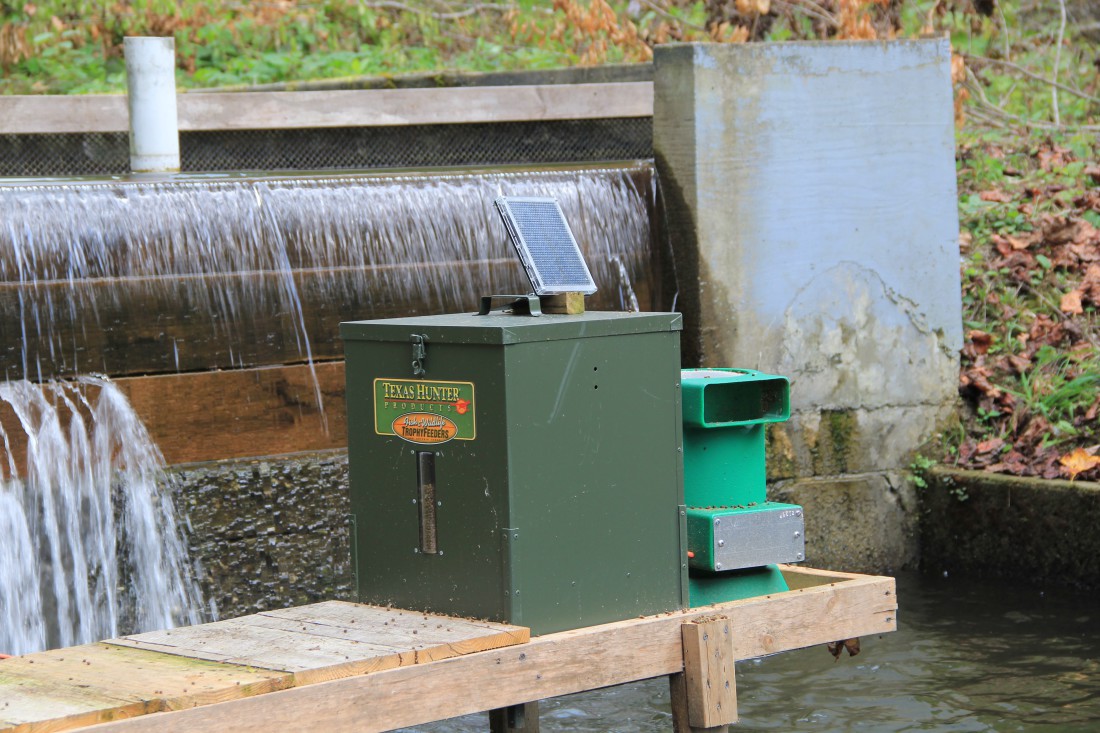Press release from Sequoyah Fund:
With North Carolina as the third highest producer of trout in the United States, John McCoy, owner of Smoky Mountain Trout Farm, has been experimenting with new and innovative sustainable trout farming techniques that he hopes could help increase profits for farmers. McCoy is wrapping up his first season in which he has combined solar energy with the inclusion of natural food sources at his trout farm.
Last spring, McCoy utilized a grant award from WNC AgOptions and a business loan from Sequoyah Fund, a community loan fund, to convert his farm energy supply from electric to solar. He equipped his farm with solar fish feeders for daytime feeding and installed solar powered bug zappers that supply his fish with insects, a naturally high protein source, for night feeding.
In working with small businesses on a daily basis, Russ Seagle, Executive Director of Sequoyah Fund, sees start-up costs as one of the most common challenges that entrepreneurs face. Likewise, initial costs for solar panel installation often present a barrier for business owners and consumers.
“The way John combined funding sources demonstrates his ingenuity and resourcefulness. We are happy that funds from our lending program could be combined with grant funds to make a significant bottom line impact in John’s business,” says Seagle.
With McCoy’s approach he is not only incorporating sustainable farming methods, but he is also increasing his bottom line. His energy bill has decreased by an average of $120 per month, and the addition of the insects into the fish’s diet has decreased the amount of feed he is using. He estimates that the bugs will offset his feed expenses by $5,000 annually.
McCoy, a seasoned farmer with 45 years of experience, explains, “In trout farming your profit margin is determined on the cost of fish food. With this set up, I’m able to offset that.”
He initially purchased 5,000 pounds of fish in April, and with his monthly weigh counts, he estimates that he will sell 20,000 pounds of fish at the end of October. And, buyers are already lining up. There is a high demand from processors, but he could also sell to a stocking program. Both options would be beneficial to the state’s economy, either by supporting the food or tourism industry.
But, McCoy also hopes these new techniques will be beneficial for trout farmers. During his time in the U.S. Trout Farmers Association, he advocated for reasonable resale prices to help expand the market and support the trout farmers.
“We see a lot of mark up, but it’s not the farmers that are making all of that,” says McCoy. With more competitive prices at the grocery store, he feels more people would buy trout more often.
After he sells this batch of fish, McCoy will make his final calculations and determine exactly how profitable the new techniques have been. While his sustainable cost-savings model can be replicated by other trout growers, McCoy says other types of farms, such as chicken or pig, can also use it.
In reflecting on the average American’s food choices, McCoy touts the health benefits – high in protein and Omega-3’s – of trout. He also recognizes that the oceans are becoming more polluted and the land is becoming more and more contaminated with pesticides. “Our food sources will have to adjust,” he says.
McCoy adds, “The future is in healthy food that comes from waters that are clear and fields that are clean. And, that’s what we have in the Smoky Mountains.”
About Sequoyah Fund
Sequoyah Fund is an independent, non-profit Native American Community Development Financial Institution (CDFI) that focuses on economic and community development within the Qualla Boundary, the home of the Eastern Band of Cherokee Indians. Their program offering includes services for aspiring business owners, individuals seeking to improve their credit and personal financial management skills, and youth. To date, Sequoyah Fund has dispersed over $14 million in loans, which has resulted in the creation of nearly 1,000 jobs. More information on Sequoyah Fund can be found online at www.sequoyahfund.org.





Before you comment
The comments section is here to provide a platform for civil dialogue on the issues we face together as a local community. Xpress is committed to offering this platform for all voices, but when the tone of the discussion gets nasty or strays off topic, we believe many people choose not to participate. Xpress editors are determined to moderate comments to ensure a constructive interchange is maintained. All comments judged not to be in keeping with the spirit of civil discourse will be removed and repeat violators will be banned. See here for our terms of service. Thank you for being part of this effort to promote respectful discussion.